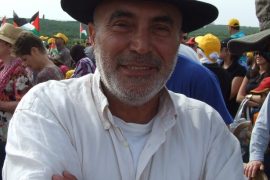1) The ITIC has published a paper titled “The Collapse of the Islamic State: What Comes Next?“.
“Will ISIS continue to exist after the collapse of the Islamic State? In ITIC assessment, ISIS will exist but will change its character and the modus operandi of its activities. It will change from an organization which controlled extensive territories and administrated the local inhabitants to what it was before, that is, a terrorist guerrilla organization unconnected to a territorial base. Once it collapses, in all probability ISIS will reorganize, applying lessons learned from the failure of the establishment of the Islamic State. During that time the organization will try to continue carrying out terrorist-guerrilla attacks and eventually to upgrade them to prove it still exists as a leading jihadist organization. Its main targets will probably be the Iraqi army, the Syrian army, the Russian and American presences in Syria and Iraq, and governmental targets in Iraq and Syria, Shi’ite-Alawite targets and targets affiliated Iran and Hezbollah in Syria and Iraq.”
2) Jonathan Schanzer discusses the US president’s announcement concerning Jerusalem.
“…Trump’s announcement is, at its core, a bureaucratic one. He will move the U.S. embassy to Jerusalem in recognition of the indisputable fact that Jerusalem is Israel’s capital. Jerusalem is home to the prime minister’s office, the Ministry of Foreign Affairs, the Knesset (legislature), and the Supreme Court, to name a few. So it makes sense that Jerusalem is where the majority of America’s diplomatic activity in Israel will take place once the move is made.
What’s more, the decision to recognize Jerusalem as Israel’s capital was not really Trump’s to make. It’s already enshrined in a 1995 law that passed with overwhelming bipartisan support. Successive presidents have issued waivers to postpone the embassy move. But that does not negate the official American view of the city and its relationship to the Jewish state.”
3) Michael Totten also comments on the US recognition of Jerusalem as Israel’s capital.
“Jerusalem is Israel’s capital for a basic and incontrovertible reason. With the single exception of the Ministry of Defense, it’s where Israel’s government buildings are located. That, and nothing else, is what makes a nation’s capital its capital. And as Senator Ben Cardin (D-Maryland) said on CNN Wednesday, “a sovereign nation has the right to choose its capital.” No nation on earth—not the United States nor any other—has the right to deny another nation its capital. One may wish that Israel’s government buildings were located in Tel Aviv—or, in Hamas’ case, nowhere at all—but they aren’t. They’re in Jerusalem. […]
Whatever happens to East Jerusalem, West Jerusalem is not going anywhere. It’s Israeli—period—and everyone knows it, including the Palestinian Authority and the Arab states even if they’re too afraid of their own extremists to say so in public.”
4) Douglas Murray discusses one example from the BBC’s ample coverage of the Jerusalem story.
“The reaction around the world in recent days has been a reminder of the one central truth of the whole conflict. Those who cannot accept that Jerusalem is the capital of the State of Israel tend to be exactly the same as those who cannot accept the State of Israel. Consider the expert whom the BBC’s flagship current affairs programme Newsnight chose to bring on to receive soft-ball questions on this issue. Dr. Ghada Karmi, from the Institute of Arab and Islamic Studies at the University of Exeter, a notorious opponent of Israel, was inevitably given the sort of respectful interview style that Newsnight presenters generally reserve for when they are interviewing Madonna or some other mega-star they cannot believe their luck at having gotten to speak with. […]
Ghada Karmi was not challenged on the claim that the Israelis were about to take over any and all Islamic holy places (to do what?), but Ambassador Regev’s suggestion that the State of Israel already has its Parliament, Supreme Court and every wing of government in Jerusalem, and that Jerusalem might just be Israel’s capital, was treated as though it were the most inflammatory nonsense the BBC had ever heard.”




